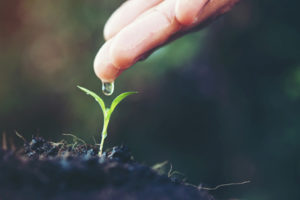What is “Organic Cotton?”
Organic cotton is grown using methods and materials that have a low impact on the environment. Organic production systems replenish and maintain soil fertility, reduce the use of toxic and persistent pesticides and fertilizers, and build biologically diverse agriculture. Third-party certification organizations verify that organic producers use only methods and materials allowed in organic production. Organic cotton is grown without the use of toxic and persistent pesticides and synthetic fertilizers. In addition, federal regulations prohibit the use of genetically engineered seed for organic farming. All cotton sold as organic in the United States must meet strict federal regulations covering how the cotton is grown.
How much organic cotton is grown globally?

Organic cotton grown by farmers worldwide increased 152 percent during the 2007-2008 crop year, according to the Organic Cotton Farm and Fiber Report 2008 released by Organic Exchange. As a result, organic cotton production reached 145,872 metric tons (MT), equaling 668,581 bales, grown on 161,000 hectares in 22 countries.
Approximately 60 percent of the total represents expansion of known projects, while the remaining 40 percent represents data from new projects becoming certified or previously unknown projects. According to the report, the production increase was driven in large part by the heightened demand for organic cotton from small- to large-sized retailers around the world.
India took over Turkey’s long-standing position as the leader, seeing its production increase by 292 percent to reach 73,702 MT, or about half of world organic cotton production. Other leading organic cotton producers, according to rank, were Syria, Turkey, China, Tanzania, United States, Uganda, Peru, Egypt and Burkina Faso.
24 countries and worldwide production was growing at a rate of more than 50% per year. .
How is the apparel industry involved with organic cotton?
Apparel companies are developing programs that either use 100 percent organically grown cotton, or blend small percentages of organic cotton with conventional cotton in their products. There are a number of companies driving the expanded use of domestic and international organic cotton.
What kinds of products are made using organic cotton?
As a result of consumer interest, organic cotton fiber is used in everything from personal care items (sanitary products, make-up removal pads, cotton puffs and ear swabs), to home furnishings (towels, bathrobes, sheets, blankets, bedding), children’s products (toys, diapers), clothes of all kinds and styles (whether for lounging, sports or the workplace), and even stationery and note cards.
In addition, organic cottonseed is used for animal feed, and organic cottonseed oil is used in a variety of food products, including cookies and chips.
Some more interesting facts.
It’s pretty obvious that cotton is the most widely used fabric in the world.
AND IF WE MAKE A CALCULATED GUESS YOU ARE WEARNING COTTON WHILE READING THIS.
But did you know that traditional cotton farming poses a huge threat to our environment and to our health as well?
Did you know that cotton production accounts for 25% of all the pesticides used in the whole world each year?
What’s more, the 5 pesticides most often used on cotton (cyanide, dicofol, naled, porpargite and triluralin) are scientifically known as Category I and II cancer-causing chemicals
*Over 10,000 people die each year from cancer related to pesticides in America alone.
Pesticides are found not only on plant but run into the rivers, contaminate the groundwater, and even the air when they’re sprayed (less than 25% of the chemical actually lands on the plant when sprayed from a duster.) When you take into account that appox 300 gms of fertilizer is used for each Kg of cotton produced, you have some serious environmental impact.
The problems with clothing production don’t stop in the field. During the conversion of conventional cotton into clothing, numerous toxic chemicals are added at each stage— silicone waxes, harsh petroleum scours, softeners, heavy metals, flame and soil retardants, ammonia, and formaldehyde— to name just a few.
“Pesticide poisoning is a serious health problem that disproportionately affects infants and children. Key risks are cancer, birth defects, and damage to the nervous system and the functioning of the endocrine system. At least one million require hospitalization world wide. The number of children involved in such incidents is unknown but, Between one and three agricultural workers per every 100 worldwide suffer from acute pesticide poisoning [1, 2], and adolescents are often the victims.[3, 4] ( Research conducted by World Health Organization WHO )
Buying organic and living an organic, eco-friendly lifestyle isn’t just about money or trends or rock stars throwing a concert. The choices you and I make every single day with our finances are just as important giving polio vacancy to our children.
This Eco-friendly cotton is safe and comfortable even for people with weak or sensitive skin, like babies, aged people, patients and pregnant women.
Our Organic cotton yarn is certified by Control Union Certifications Organization (Formerly SKAL INTERNATIONAL) Now GOTS.
